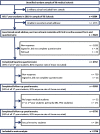Medical School Factors Associated with Changes in Implicit and Explicit Bias Against Gay and Lesbian People among 3492 Graduating Medical Students
- PMID: 28766125
- PMCID: PMC5653554
- DOI: 10.1007/s11606-017-4127-6
Medical School Factors Associated with Changes in Implicit and Explicit Bias Against Gay and Lesbian People among 3492 Graduating Medical Students
Erratum in
-
Correction to: Medical School Factors Associated with Changes in Implicit and Explicit Bias Against Gay and Lesbian People among 3492 Graduating Medical Students.J Gen Intern Med. 2018 Sep;33(9):1586. doi: 10.1007/s11606-018-4423-9. J Gen Intern Med. 2018. PMID: 29744718 Free PMC article.
Abstract
Background: Implicit and explicit bias among providers can influence the quality of healthcare. Efforts to address sexual orientation bias in new physicians are hampered by a lack of knowledge of school factors that influence bias among students.
Objective: To determine whether medical school curriculum, role modeling, diversity climate, and contact with sexual minorities predict bias among graduating students against gay and lesbian people.
Design: Prospective cohort study.
Participants: A sample of 4732 first-year medical students was recruited from a stratified random sample of 49 US medical schools in the fall of 2010 (81% response; 55% of eligible), of which 94.5% (4473) identified as heterosexual. Seventy-eight percent of baseline respondents (3492) completed a follow-up survey in their final semester (spring 2014).
Main measures: Medical school predictors included formal curriculum, role modeling, diversity climate, and contact with sexual minorities. Outcomes were year 4 implicit and explicit bias against gay men and lesbian women, adjusted for bias at year 1.
Key results: In multivariate models, lower explicit bias against gay men and lesbian women was associated with more favorable contact with LGBT faculty, residents, students, and patients, and perceived skill and preparedness for providing care to LGBT patients. Greater explicit bias against lesbian women was associated with discrimination reported by sexual minority students (b = 1.43 [0.16, 2.71]; p = 0.03). Lower implicit sexual orientation bias was associated with more frequent contact with LGBT faculty, residents, students, and patients (b = -0.04 [-0.07, -0.01); p = 0.008). Greater implicit bias was associated with more faculty role modeling of discriminatory behavior (b = 0.34 [0.11, 0.57); p = 0.004).
Conclusions: Medical schools may reduce bias against sexual minority patients by reducing negative role modeling, improving the diversity climate, and improving student preparedness to care for this population.
Keywords: longitudinal studies; medical education; prejudice; sexual minorities; sexual orientation.
Conflict of interest statement
The authors declare that they do not have a conflict of interest.
Figures
Comment in
-
Capsule Commentary on Phelan et al., Medical School Factors Associated with Changes in Implicit and Explicit Bias Against Gay and Lesbian People among 3492 Graduating Medical Students.J Gen Intern Med. 2017 Nov;32(11):1248. doi: 10.1007/s11606-017-4160-5. J Gen Intern Med. 2017. PMID: 28822044 Free PMC article. No abstract available.
-
Medical Education Then and Now.J Gen Intern Med. 2017 Nov;32(11):1163-1164. doi: 10.1007/s11606-017-4165-0. J Gen Intern Med. 2017. PMID: 28875254 Free PMC article. No abstract available.
-
Response to Capsule Commentary.J Gen Intern Med. 2018 Apr;33(4):403. doi: 10.1007/s11606-018-4313-1. J Gen Intern Med. 2018. PMID: 29383549 Free PMC article. No abstract available.
References
-
- Office of Disease Prevention and Health Promotion. Lesbian, Gay, Bisexual, and Transgender Health. [Webpage]. https://www.healthypeople.gov/2020/topics-objectives/topic/lesbian-gay-b.... 2017.
-
- 2014 National Healthcare Quality and Disparities Report. Rockville, MD: Agency for Healthcare Research and Quality; 2015.
-
- Committee on Lesbian G, Bisexual, and Transgender Health Issues and Research Gaps and Opportunities. The Health of Lesbian, Gay, Bisexual, and Transgender People: Building a Foundation for Better Understanding. Washington, DC: Institute of Medicine.
MeSH terms
Grants and funding
LinkOut - more resources
Full Text Sources
Other Literature Sources


